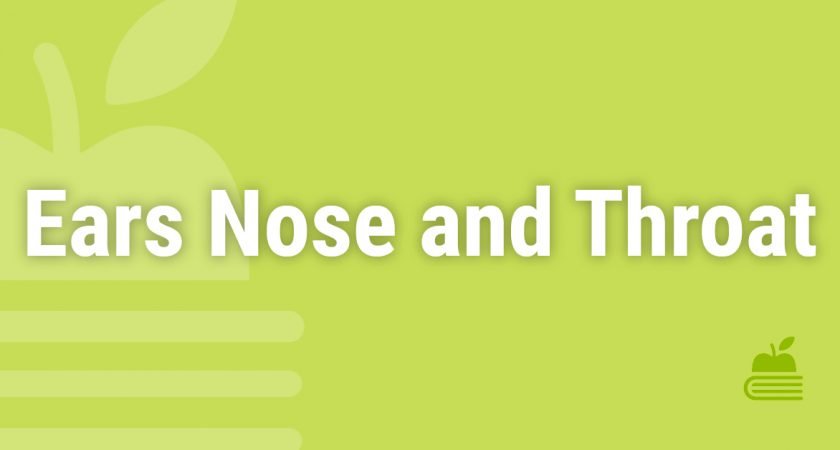Read week
Hi Everyone,
Stop for a minute and process where you are at the moment. What can you hear? What can you smell? Take a few minutes to choose a piece of music to accompany your study – I always find piano pieces by Yiruma to be calming, and music from movies to be motivating. If you have a snack or a hot drink nearby take one minute to put it into your mouth and hold it there – feel the temperature, texture, taste. Use moments like this as meditative experiences to help focus you for the study ahead.
This newsletter is about the ears, nose and throat.
Sore throat is a common cause for presentation for patients, particularly around winter time. It is the doctor’s responsibility to make decisions about what treatment is required. A sore throat in the context of rhinorrhoea, sneezing, change in season may be secondary to post nasal drip in an atopic patient. A sore throat in the context of cough, myalgia, headache, fatigue and exposure to others who are similarly unwell may be a mild viral upper respiratory virus. The Centor criteria can be used to determine the likelihood of Group A streptococcus with points given if there is tonsillar exudate, tender cervical lymphadenopathy, temperature >38 degrees Celsius and absence of cough. Understanding the Centor criteria can significantly decrease the frequency that antibiotics are given which is better for everyone.
Vertigo is a very common condition, and can be scary for the unprepared GP. Australian Family Physician has a very clear article that covers the primary differentials for dizziness and helps clear the uncertainty. Initially determining the difference between lightheadedness and vertigo is important. The next step in diagnosis lies in determining the cluster of associated symptoms – such as ear pain, vertigo exacerbated with head movement, deafness, fever, recent viral illness. Knowing these clusters of symptoms can help identify the cause easily.
Ear pathology can give an array of symptoms – ear pain, ear fullness, vertigo, deafness, ear discharge, ear swelling, fever. It’s important to not view these symptoms in isolation but to consider their context. While otitis media is common, one should always have in the back of their mind differentials such as Ramsey Hunt Syndrome, cholesteatoma, Eustachian tube dysfunction, temporomandibular joint dysfunction and dental abscess as the cause for ear pain.
Be kind to yourself and take some time to go outside and pick your nose, I mean, a flower this week!
Dr Andrew Harris
Director of Amadeus Education.
Did you know?
According to BEACH data, 3.2% of all encounters in General Practice were specifically related to the ear. Consider this as you are preparing for your exams. (Source: General practice activity in Australia: 2015-16. https://bit.ly/2c4d8Em)
Presenting complaints:
These are the common presenting complaints that should be covered for this topic:
- Deafness and hearing loss (https://bit.ly/2HbKeRu)
- Dizziness/vertigo (https://bit.ly/2stf3H2)
- Ear discharge (otorrhoea) (https://bit.ly/2QObdlD)
- Ear pain (https://bit.ly/2Cp6EJf) (BEACH)
- Epistaxis (https://bit.ly/2SWXIlE)
- Facial pain (https://bit.ly/2FAmMuN)
- Halitosis (https://bit.ly/2sveQmS)
- Hearing loss
- Hoarseness (https://bit.ly/2ST2sbH)
- Mouth conditions, bleeding and painful gums (https://bit.ly/2RPsO11)
- Mouth conditions, sore tongue (https://bit.ly/2AMRL3M)
- Nasal drip (rhinorrhoea) (https://bit.ly/2CpHBpH)
- Neck lump
- Sinusitis
- Sneeze/ nasal congestion (BEACH)
- Sore throat (https://bit.ly/2T2duvG) (BEACH)
- Tinnitus (https://bit.ly/2RPvxYj)
Common conditions:
These are the common conditions that should be reviewed for this topic:
Topics | Important reading |
Audiometry |
|
Vertigo – Benign paroxysmal positional vertigo, labrynthitis, vestibular neuronitis, Meniere’s disease. |
|
Tinnitus |
|
Nasal obstruction – Sinusitis (BEACH), Allergic rhinitis |
|
Throat pain – Tonsillitis/ pharyngitis (BEACH), Infectious mononucleosis, URTI (BEACH) |
|
Ear infections – Otitis media, Otitis externa |
|
Eustachian tube dysfunction |
|
Cholesteatoma |
|
TMJ Dysfunction |
|
Medication doses:
These are the medications and doses that should be learned for the exam:
Condition | Medication |
Otitis media |
|
Bacterial sinusitis |
|
Bacterial tonsillitis |
|
Mnemonics:
These are some important mnemonics relevant to this topic:
- Centor criteria (https://bit.ly/2Fw0bML)
CHECKS:
Here are the list of recommended Checks that would be useful in your study for GP exams (accessed via subscription from http://gplearning.racgp.org.au):
- Ear, nose and throat, March 2016
- Dizziness, July 2011
- Ear, nose and throat, April 2011
Focus on clinical skills:
Here is a brief focus on some OSCE preparation topics related to this topic:
- Dix-Hallpike and Epley Manoeuvre
- Assessment of dizziness
Head and neck examination playlist from GP Synergy: https://bit.ly/2RvPkg6
Copyright © 2021 Andrew Harris

